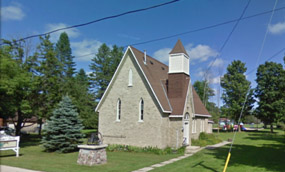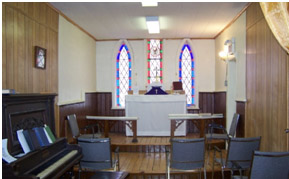Are a group of about a dozen independent Anglican Christians in Hepworth Ontario who do not worship in an Anglican Church of Canada parish  because of the ACoC’s increasingly rapid drift away from Biblically orthodox Christianity. A priest, Father Robert Mansfield, from the Anglican Catholic Church of Canada (ACCoC) visits once a month to administer Communion.
because of the ACoC’s increasingly rapid drift away from Biblically orthodox Christianity. A priest, Father Robert Mansfield, from the Anglican Catholic Church of Canada (ACCoC) visits once a month to administer Communion.
The congregation is presently meeting in the Hepworth Community Centre. Up until 40 years ago, the community centre was an Anglican Church; it still has stained glass windows, altar rails and the church bell – on display on the front yard – still rings even after being exposed to decades of Ontario winters.
The building is over 100 years old and in need of repair; the town  is now considering whether to demolish or sell the building. The congregation is willing to raise funds to assist in paying for the repairs, but is too small to completely pay for them.
is now considering whether to demolish or sell the building. The congregation is willing to raise funds to assist in paying for the repairs, but is too small to completely pay for them.
The congregation has asked for prayers and, for those who may be interested in assisting in helping to preserve this building for its intended use of glorifying God, they can be reached here and at 519-374-4371.
The town is holding a public meeting about this on Wednesday April 14th and can be reached here.


